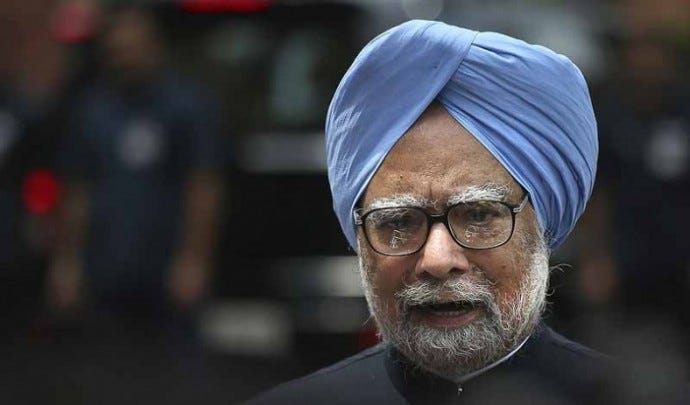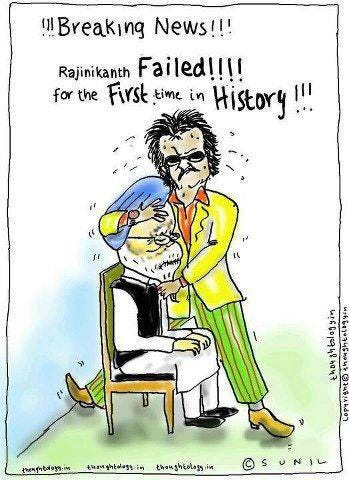The Silent Man and his Silent Joke
by Sumana Roy
Of all things I know, it is most difficult to make jokes about silence. Someone slips and falls, literally and metaphorically, someone says something inappropriate, we laugh. Our jokes seem to be anchored around movement, action, motion. Silence, with its stillness and indifference to cosmetic training, lacks the personality to birth jokes. It is amusing, then, to find a genre of jokes built around the silence of Manmohan Singh, India’s former Prime Minister.
Jokes often move around the axes of stock characters and stereotypes. The Santa-Banta laughter industry, for instance, is built around the low intelligence of two Punjabi men. Here’s a sample:
A street dog was chasing Santa and he was laughing.
A bystander: Why are you laughing?
Santa: I have an Airtel phone, but still Hutch network is following me.
Manmohan Singh, with his well-furnished curriculum vitae that includes Oxbridge degrees, apart from holding academic positions at universities both in India and abroad, Governor of RBI, Finance Minister, Director of IDBI, Chief Economic Advisor at Ministry of Finance, in the past, was difficult — no, impossible — to fit into the Santa-Banta template. Neither could his turban be turned into an object of laughter: remember that this was also the time that the Indian cricketer Harbhajan Singh was demolishing batting line-ups of rival teams. He had, in spite of the political incorrectness, been called the “Turbanator”. So Manmohan Singh’s turban managed to escape the grease of the joke machine. It would return towards the end of his second term as Prime Minister when two of India’s most famous journalists would begin calling him “Blue Turban”, a nomenclature which would not be condemned by the country’s liberals. (Imagine the uproar on social media, for instance, if a Muslim political leader was given a nickname after his skull cap, or a Hindu for his sacred thread.)
Well done, Blue Turban! Honest, from-the-heart spelling out of the urgent need for reforms. You need to speak more often MMS. #MMSpeaks
— Sagarika Ghose (@sagarikaghose) September 21, 2012
At first, Singh was turned into a wizard like figure with the kind of orientalist discourse that defined the way English cricketers once spoke of Indian spin bowlers. Singh had turned the Indian economy into a thing of temporary wonder, and cartoonists spent all their energy on capturing the miracle. Soon, though, attention moved from the magician to the magic. Mass hypnosis, after all, has a short lifespan. This magician, people wondered why they hadn’t noticed before, did not use the mantra: the nation waited for him to say the abracadabra. No such thing happened — our political commentators told us that this was because the magician had outsourced the magic to someone who, like him, spoke little.
Besides the Congress Party, the two shared something in common: it was silence. The joke factory, having found nothing colourful, decided to glam up silence. So silence became Silence. And Sonia Gandhi became the Sphinx, a heritage site that was turned on near-permanent Mute Mode. She began to mentor Singh’s silence. And the jokes began to arrive.
A few days ago, I had the chance to watch the historian Dipesh Chakrabarty in a Youtube clip from Mirakkel, a popular comedy show in Bangla. After the usual showering of praise on the anchor and participants, Chakrabarty named a few people whose jokes had stayed with him. One of these, he recounted gleefully, was about the Prime Minister Manmohan Singh: ‘Singh goes to a dentist but does not show his teeth. The exasperated dentist tells Singh: ‘At least open your mouth now’.
Chakrabarty confessed to having used the joke across many continents, where he lived, taught and lectured. One of the most influential historians from the Subaltern Studies group, he is more aware of the politics (and aesthetic) of silence than the viewers of Mirakkel, a television show whose lifeblood comes from making fun of the old, LGBT groups, housewives, among others. Yes, we live in a time where ‘voice’ is one of the most important political instruments for negotiation and engagement, but to homogenise this in such a way so that all political leaders are expected to behave in a certain, albeit masculine, way, as we have seen in leaders, both male and female, who have called for war, is to be insensitive to difference.
The jokes about Manmohan Singh’s silence turn the politician into an emasculated man, especially when contrasted, as it was before the elections, against the virility of Narendra Modi’s deep and resolute voice. They bring into their ambit rude and cruel notions about impotency, about shouting as a masculine virtue and silence as a female habit. When I, in disappointment, mentioned this to my husband, we suddenly laughed out together, saying the words at the same time. Our joke was founded on the title of a famous essay by Gayatri Chakraborty Spivak.
‘Can the Subaltern Speak?’
Sumana Roy is a co-founder and editor at AntiSerious. She writes from Siliguri, a small town in sub-Himalayan Bengal




